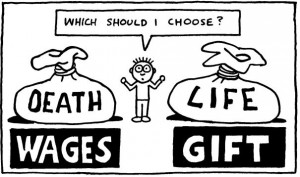Jeremiah 2:19 repeats what has been said earlier but does so in a very succinct an impactful way. It reads, “Your evil will chastise you, and your apostasy will reprove you. Know and see that it is evil and bitter for you to forsake the LORD your God; the fear of me is not in  you, declares the Lord GOD of hosts.” In his profoundly devotional and applicable way, Wiersbe says, “A basic principle is enunciated in verse 19: God punishes us by allowing our own sins to bring pain and discipline to our lives. ‘Your own conduct and actions have brought this upon you. This is your punishment. How bitter it is!’ (4:18, NIV) ‘our wrongdoings have kept these [rains] away; your sins have deprived you of good’ (5:25, NIV). The greatest judgment God can send to disobedient people is to let them have their own way and reap the sad, painful consequences of their sins.”[1]
you, declares the Lord GOD of hosts.” In his profoundly devotional and applicable way, Wiersbe says, “A basic principle is enunciated in verse 19: God punishes us by allowing our own sins to bring pain and discipline to our lives. ‘Your own conduct and actions have brought this upon you. This is your punishment. How bitter it is!’ (4:18, NIV) ‘our wrongdoings have kept these [rains] away; your sins have deprived you of good’ (5:25, NIV). The greatest judgment God can send to disobedient people is to let them have their own way and reap the sad, painful consequences of their sins.”[1]
God is known for sending quail and holding back the enjoyment of them. On the other hand God is known for sending raw meal and making it a feast on our tables. But it seems that the point Jeremiah is making is that some actions carry their own consequences. As Mackay puts it, “…the thought is that there are inner connections between Judah’s actions and their consequences which will make themselves evident over time and serve to chastise and correct her. But this does not mean that the Lord is uninvolved in the process. ‘Yahweh is seen as the one who sets the connection between act and consequence in force’ (Miller 1982:127).”[2]
“The suffering which the people now face is a clear example of a bad decision coming back to haunt them. They have turned to other nations and their gods looking for help, but it is those nations who have let them down, in fact, who have turned against them and hurt them. They have forsaken the Lord, and so he has allowed them to suffer the consequences of that decision. They are experiencing the bitter taste of the fruits of their actions.”[3] Now we know that death is the ultimate consequence for sin. We also know that we’ve all sinned. That’s why Paul can easily say “the wage of sin is death.” There’s no escaping that reality. But he goes on to say that “the free gift of God is eternal life in Christ Jesus Our Lord” (See Romans 6:23). Max puts it this way, “Allow the spit of the soldiers to symbolize the filth in our hearts. And then observe what Jesus does with our filth. He carries it to the cross. Through the prophet he said, ‘I did not hide my face from mocking and spitting (Isa. 50:6 niv). Mingled with his blood and sweat was the essence of our sin.”[4]
[1] Warren W. Wiersbe, Be Decisive, “Be” Commentary Series (Wheaton, IL: Victor Books, 1996), 25.
[2] John L. Mackay, Jeremiah: An Introduction and Commentary: Chapters 1–20, vol. 1, Mentor Commentaries (Fearn, Ross-shire, Scotland: Mentor, 2004), 152.
[3] Timothy M. Willis, Jeremiah/Lamentations, College Press NIV Commentary (Joplin, MO: College Press Pub. Co., 2002), 46–47.
[4] Max Lucado, He Chose the Nails: What God Did to Win Your Heart, electronic ed. (Nashville: Word Publishing, 2000), 19.